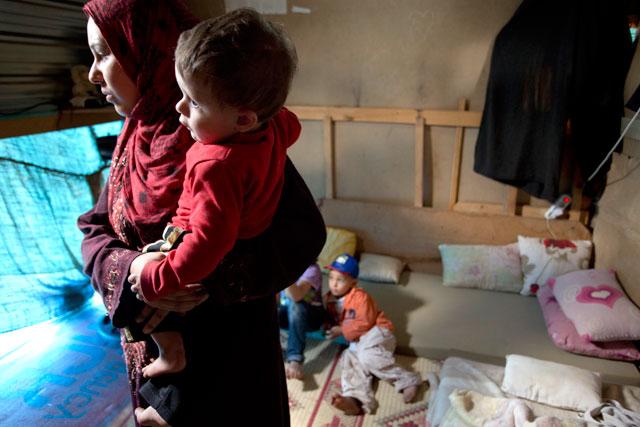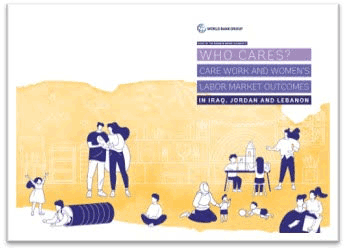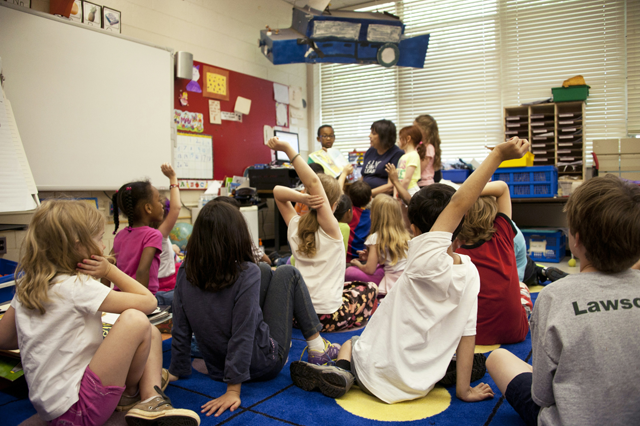You are here
Enhancing women’s labour participation in Mashreq countries will boost economic growth — WB report
By JT - Jun 23,2020 - Last updated at Jun 24,2020

A Syrian refugee holds her son in their makeshift home in Kafar Kahel informal settlement in the Koura District in Lebanon in June of 2014 (Photo courtesy of World Bank)
AMMAN — Women’s labour force participation in the Mashreq countries (eastern Arab countries) remains among the lowest in the world and is likely to be exacerbated by the COVID-19 pandemic, according to the World Bank.
Addressing prevailing social norms, legal constraints and market failures can boost women’s share of labour market participation in Iraq, Jordan and Lebanon and help their economies grow, the World Bank said in its new report released on Tuesday.
If the three countries’ targetted increases in participation of five percentage points over five years are not only met but also continue for a further decade, annual economic growth would be increased by 1.6 percentage points in Iraq, 2.5 points in Jordan and 1.1 points in Lebanon by 2035, read the statement.
“The State of Mashreq Women” report examines the reasons behind low women’s labour force participation and calls for action to provide the needed support systems, services and legal framework to incite more women to access the labour market, the WB statement said.
Less than 15 per cent of women work in Iraq and Jordan, placing these countries among those with the lowest female participation rates in the world, only after war-torn Syria and Yemen.
In Lebanon, only 26 per cent of women work. Participation is particularly low for the less-educated. While two-thirds of women with tertiary education are either employed or seeking a job, this amounts to only a small portion of the total female population in these countries — around 12 per cent in Iraq, 27 per cent in Jordan and 31 per cent in Lebanon. Labour force participation is generally higher among younger women, noted the report.
In Lebanon, women aged 15 to 44 are twice as likely to participate than those aged 45 to 64, suggesting a generational shift that is not seen in Iraq and only partly witnessed in Jordan, according to the report.
Younger women are also more likely to work in Jordan, but for those aged 25-34, participation rates reach only around 35 per cent. In contrast, for those older than 35 it is 20 per cent or lower, the WB said.
In all three countries, getting married and having children is “associated with a lower probability of participating in the labour market”, albeit with some noticeable differences, according to the report.
In all three countries men experience the opposite profile, with higher participation rates for married men and those with younger children than their unmarried counterparts.
“Securing and expanding economic opportunities for women is at the heart of the World Bank’s agenda,” said Saroj Kumar Jha, World Bank Regional Director for the Mashreq, in the statement.
“Women should have equal chances to engage in economic life, make their voices heard and fulfil their aspirations. This can promote growth, prosperity, peace and stability in the Mashreq countries,” he said.
While low female labour force participation rates are partly due to low job creation in Iraq, Jordan and Lebanon as a result of “structural economic problems” and challenges, additional barriers related to the role of women in society and within their families specifically affect the access of women to the labour market, the statement said.
The report offers policy recommendations to enhance female labour force participation in Mashreq countries. Beyond the creation of additional jobs, governments can boost women’s access to the labour market by making public transportation safer, reviewing certain laws and regulations and closing certain gaps between the law on paper and the law in practice, increasing the supply of high-quality childcare services and addressing social norms that prevent women from earning their own incomes.
“The digital economy can also contribute to promoting women’s labour force participation by allowing women to work from home with flexible hours,” said Matthew Wai-Poi, one of the lead authors of the report, in the statement.
“However, the prevailing digital gender divide means women have less access to the Internet and mobile connectivity and fewer digital skills than men. This issue is exacerbated for less-educated women. Without action to close the digital gender gap, those opportunities could become another barrier,” he said.
This first “State of the Mashreq Women” report was produced as part of the Mashreq Gender Facility, which provides technical assistance to Iraq, Jordan and Lebanon to enhance women’s economic empowerment and opportunities as a “catalyst towards more inclusive, sustainable and peaceful societies, where economic growth benefits all”, according to the statement.
Related Articles
AMMAN — The gender pay gap, low wages and low participation of women in the labour market, are all factors affecting the economic situation
AMMAN — Under the Patronage of Prime Minister Bisher Khasawneh, the World Bank Group on Thursday launched its second State of the Mashreq Wo
AMMAN — A recent World Bank report has sparked a call to action among experts in Jordan and the Mashreq region.














